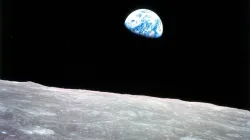Time flies faster on the Moon than on Earth, new study confirms
Efforts to measure lunar timing are part of a program that aims to increase human activity on the lunar surface. Precise timing will be crucial for pinpointing landings.

Efforts are underway to create a standard way of measuring time on the Moon as part of NASA's Artemis program, which aims to increase international activity on the lunar surface. In April 2024, the White House requested the development of a unified lunar time system to help with future missions and the establishment of human bases on the Moon. One of the main challenges is figuring out how time behaves differently on the Moon than it does on Earth, which is something related to the science behind how gravity works, as explained by Einstein.
Understanding Time Differences on the Moon
A recent study by researchers Bijunath Patla and Neil Ashby from the National Institute of Standards and Technology (NIST) explored how time works differently on the Moon compared to Earth. They found that clocks on the Moon would run about 56 microseconds faster each day than those on Earth. This difference happens for two main reasons: the Moon's weaker gravity makes the clocks tick faster, while its movement in orbit around Earth slows them down a bit. Patla explained that even a tiny difference like 56 microseconds could lead to navigational mistakes of up to 17 kilometers each day.
Why Accurate Time Matters for Moon Missions
Cheryl Gramling, a systems engineer at NASA’s Goddard Space Flight Center, emphasized how crucial it is to keep precise time for the safety and success of future lunar missions. She pointed out that astronauts, rovers, and landers will need their positions to be pinpointed within just 10 meters. This means that any timing errors, even as small as a billionth of a second, could have serious consequences. Accurate timekeeping is essential for everything to go smoothly on the Moon.
Understanding the Bigger Picture of Relativity
Researchers Sergei Kopeikin from the University of Missouri and George Kaplan from the U.S. Naval Observatory have confirmed that time can drift by 56 microseconds, which is a tiny fraction of a second. They've published their findings in various journals, discussing how smaller changes in time can be influenced by the Sun and Jupiter’s gravitational pull. These factors are important to consider when we want to perform precise operations on the Moon.
ALSO READ: Astronauts Sunita Williams and crew react to ‘Toxic’ smell on space station